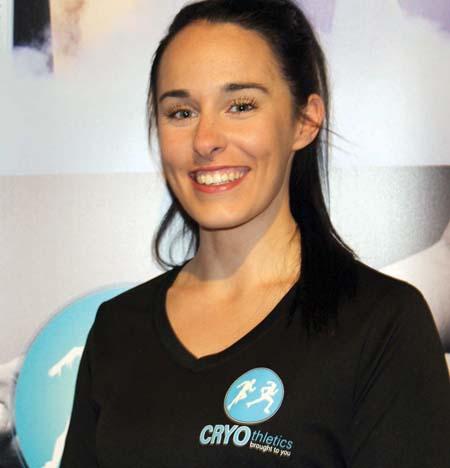February 1, 2018

Dionne McGinn believes her fledgling personal training business, Cryothletics, is on the cusp of something huge.
The 28 year-old County Tyrone native founded the business just over a year ago. Her young company is still relatively low-profile, but her branding suggests otherwise.
Sporting a Cryothletics sweatshirt, she pointed out the window of a Boston cafe toward a flashy blue Cryothletics van parked down the street. Later, she excitedly whipped out her phone to show off a photo of her new trailer, emblazoned with the same logo, an ice blue sphere enclosing two silhouetted athletes.
“I call it a rolling storefront,” said McGinn.
Cryothletics is the only mobile business in Boston specializing in cryotherapy, the process of treating injuries and pain with ultra-cold nitrogen gas. Using her van and trailer, McGinn transports an inflatable cryochamber and a smaller machine for localized treatment to her clients, where she performs on-site therapy.
The method has been used in Europe, including in McGinn’s native Ireland, for well over a decade now, but has yet to gain widespread popularity in the U.S.
“Over here, it’s very far behind, it’s just starting. So I’m very much in the stage of educating people,” she said.
A native of Eskra, a small town in County Tyrone, McGinn she gained experience in the field by working at Ireland’s first cryoclinic, where she saw how cold therapy helped Gaelic footballers accelerate their injury recovery.
Soon after, she spent a summer in Boston working with local Gaelic Football teams based in Canton. The experience working with amateur athletes confirmed McGinn’s desire to pursue a career in sports therapy, and inspired her to one day work with the pros.
What McGinn calls her “penny drop” moment of clarity happened when she encountered through her physical therapy work a certain oft-injured New England Patriot and asked if he had considered cryotherapy to help accelerate his healing process. The gridiron star had never heard of it.
“He was like, ‘What’s that?’”
In that instant, McGinn saw a window of opportunity for a business venture based in her passion of physical therapy.
“Boston’s a big sporting city, and I was like, why do the professional teams not have it? Why do the college teams not have access to this? I already know all about it, why am I waiting on someone else to do this when I can do it myself?”
With a newfound sense of clarity and purpose, McGinn set about designing her own logo, and her vision for Cryothletics gradually came into focus. Soon enough, with the addition of a sleek website, a collection of branded Cryothletics memorabilia, and McGinn’s small vehicular fleet, the idea materialized into something concrete.
McGinn believes just as firmly in her methodology as in her business model. She explained how liquid nitrogen gas, at around negative 200 degrees Fahrenheit, has a similar effect to ice, but works more efficiently and at a deeper cellular level.
Treatment takes no more than a few minutes, and does not pose a threat of frostbite when administered properly. McGinn says cryo is also more accurate than cortisone shots, the preferred pain treatment method of many U.S. sports doctors, due to the fact that they are only effective if injected in precisely the right spot.
Cryogenic technology is backed by science, and based on its ubiquity in Europe, McGinn sees a U.S. market primed for a cryo-revolution.
“All the soccer teams over there use them. They’re even using it on horses now,” she laughed. “There are racehorses walking into cryochambers for treatment.”
Right now, McGinn’s focus is still on humans— and her challenge is getting people to gain trust in her and her largely foreign method. But she says she’s already built a core client base in the greater Boston area, the entirety of which has been pleased with the results of their treatment. Apart from injury recovery, McGinn’s business also offers services related to the numerous health benefits of cryotherapy. She treats patients with chronic pain, rheumatoid arthritis, and psoriasis, and also offers cosmetic treatments including cryo facials and “fat freezing,” a non-surgical body sculpting procedure.
But working with professional athletes is still the ultimate objective for McGinn, who is already on her way to realizing that goal. After meeting the Reporter for an interview, she was taking her van over to Stoughton to treat a former Boston Celtic player who had complained about back soreness after an afternoon of play with his kids. McGinn is hoping that word of mouth will do just as much as her branding in helping her name reach the ears of athletes and team doctors.
“The whole time I’m just trying to keep the end vision in mind,” she said. McGinn’s approach is innovative, but her story echoes those of many who came before her. “I flew over here with just three suitcases,” she said, “with an idea and a dream.” With Cryothletics in the ascendant, it may not be long before McGinn’s dream becomes a reality.

